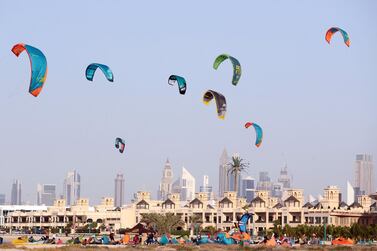Public and private sector workers in the UAE will have the same number of holidays as of this year.
That is according to a UAE Cabinet decree issued on Tuesday that also standardised holiday dates for this year and the next.
Some of the holidays listed by the Cabinet have been presented according to the lunar calendar, with no corresponding Gregorian calendar date - such as for Eid Al Fitr, Eid Al Adha and the Islamic New Year. This is because the dates are subject to the lunar calendar and will be announced by the UAE's moon-sighting committee closer to the time.
The estimated Gregorian calendar dates The National has listed for those three holidays below, correspond with the Hijri calendar on the General Authority of Islamic Affairs and Endowments - or Awqaf - website.
With that disclaimer out the way, we come to the important questions:
When is the next public day off?
Now that Israa Wa Miraaj, which would have fallen in April, is no longer listed as a public holiday, the next day off we can all look forward to is Eid Al Fitr, a two-day celebration to mark the end of Ramadan. This is likely to fall on Monday June 3, though this depends on when Ramadan begins and ends too. The number of days off will also vary depending on whether Ramadan lasts 29 or 30 days.
Following that will be Eid Al Adha. The holiday begins on Arafat Day - most likely August 10 - and lasts four days, until August 13. August 10 is a Saturday but employees who work a five-day week will still get three working days off.
Next up will be the Islamic New Year on Muharram 1, or Saturday, August 31. Commemoration Day has been moved to December 1, a Sunday, to merge with two days off for National Day on December 2 and 3.
.@uaegov: The #UAE Cabinet approves public holidays for the public sector for the years 2019-2020, and grants the private sector equal holidays. The decision aims at achieving a balance between the two sectors and supporting the national economy. pic.twitter.com/ipvMAUhXgo
— Dubai Media Office (@DXBMediaOffice) March 5, 2019
Has the number of public holidays changed?
It is difficult to tell because the number of days off varies each year depending on how the Islamic calendar - which is based on the lunar cycle - lines up with the Gregorian calendar - that is based on the solar year.
Last year, private sector employees, who work Saturdays, had 10 days off, as did government workers. Private sector workers who have a two-day weekend only had eight days off last year. However, last year was slightly unlucky because many Islamic holidays coincided with the weekend. November 30, 2018, Commemoration Day, fell on a Friday and the two-day holiday for Eid Al Fitr fell over a weekend too.
This year, and in 2020, government and private sector employees will each have a standard 14 public holidays. And while the Prophet's Birthday and Israa Wa Miraaj have been removed from the list of public holidays, extra days have been added by increasing the Eid Al Fitr and Eid Al Adha holidays.
How does the UAE fare compared with other countries?
As far as the number of days off go, the UAE is a good place for employees to be. With 14 days off, the UAE hovers about midway between the country with the most days off and that with the fewest.
Cambodia is the country with the most days off a year with 28 public holidays. Many are religious observations related to Buddhism and are subject to change based on how the Khmer calendar aligns with the Gregorian calendar. India is up next with up to 21 public holidays, depending on the state you live in.
At the lower end of the list is the UK with eight public holidays a year, Germany, Serbia and Hungary with nine days and there's 10 in the US. But the prize for least number of public holidays a year goes to Mexico with only seven.
Why were the number of public holidays for public and private sector unified?
The UAE Cabinet announced the changes in a tweet this week, explaining that the decree aims to achieve balance between the two sectors and support the national economy. It said it would help streamline work within, and between, the public and private sector.
The standardisation of holidays between sectors is also part of government efforts to attract Emiratis to work in private companies. In the UAE, the public sector has historically been seen as a more prestigious and rewarding career path, offering nationals an opportunity to serve their country with an attractive package that includes more days off, and generally higher salaries.
But encouraging more Emiratis to enter the private sector is seen as crucial in ensuring there are enough jobs to go around, both now and in the future.
And of course unifying public holidays for both sectors will also make it easier for people to plan for their days off.







